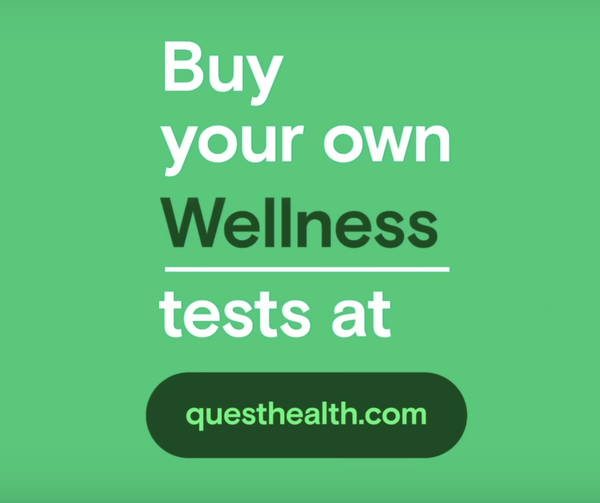
When Jim Davis, Quest Diagnostics chief
executive officer-elect, expressed the aim last month to increase
direct-to-consumer clicks and purchases “once we get eyeballs to the site,” we weren’t expecting the lab testing company to drive said traffic via a major national marketing
campaign.
Yet here’s “Put Your ___ To The Test" from Interpublic’s R/GA, the first campaign to tout more than 50 consumer-initiated lab tests now available from Quest -- and
without doubt the largest consumer campaign in the company’s 55-year history.
“What we endeavor to become is a consumer lifestyle brand,” said Ryan Anderson, Quest
Diagnostic’s executive director of consumer marketing, in a talk with Marketing Pharma and Health Weekly. He is looking for the brand to achieve $250 million in revenue by 2025.
advertisement
advertisement
The marketing campaign, running through 2023, started “full-throttle” last week. Media includes connected TV/streaming on Hulu, FX, History, ESPN and other networks;
“high-impact” mobile; digital display; paid social media, a “great amount” in paid search; influencer marketing; and out-of-home in key markets.
Ads have begun running
in New York City subways, along with a seven-billboard takeover of the W Hotel in West Hollywood. New York will also see OOH in Bryant Park, Penn Station and Herald Square, while other markets
like Houston, Dallas and Miami will be targeted in coming months, Anderson said.
For Anderson, the campaign marks the culmination of over two years’ work since joining Quest smack dab in
the middle of COVID’s first summer.
Like the rest of the team he would hire to work on Quest’s D2C marketing, Anderson came from outside the healthcare field. A TV industry
veteran with stints at the History channel and ESPN college football, most recently he led marketing for Marriott’s newest brands like AC Hotels, Element and Moxy.
Remembering July 2020,
he says, “People were not in need of hotels, but they were in need of diagnostic testing.”
Quest had been selling tests directly to consumers since 2018, but it was a
“bootstrapped, shoestring business, where any investment had to come directly from the revenue,” he explained.
The pandemic, however, “caused a behavioral change in the
category,” leading to a change in Quest’s own commitment to the consumer business.
Two changes in consumer behavior, he noted, were the “incredible” rise in both
ecommerce and telehealth, putting Quest’s D2C efforts right in the “crosshairs.”
“As we were seeing behavior change, and then not peak-and-descend but peak-and-plateau,
we recognized the opportunity,” he recalled.
The result was transforming a business then in an “entry-level model” into a real consumer brand with “digital experiences
in line with what we’ve come to expect in ecommerce, from Walmart to Domino’s to Cabela’s.”

Anderson’s team brought on Redscout to work on positioning
and identity.
One result: unlike the corporate B2B part of the company, which remains “Quest Diagnostics,” the consumer brand is just “Quest,” which Anderson calls a
“bit more personable.”
The ads – including this :30 video spot – focus on three major testing
categories that together cover 80% to 85% of Quest’s D2C tests: general wellness, allergies and sexual health.
The target audience falls into several categories, but individuals may well
fit into more than one at any given time, Anderson said.
Two categories were described earlier by CEO-elect Davis as “privacy seekers” (people who don’t want their doctors
and/or insurance companies to know what they’re testing for) and “watchful warriors” (people with chronic diseases who want to get tested more frequently than their health insurance
covers).
Anderson breaks the targets into “another dimension: need states.”
These include not only people with chronic conditions, but also people looking for prevention
(they “want to understand their baselines and what risks may be ahead of them”), people who are symptomatic (they have “a hunch something’s not as good as it could be”)
and finally, people into performance (they’re in peak health and “looking to find their edge.”).
More generally, Quest is targeting digital-savvy changemakers, described as
people who take “a proactive direction in their health and are interested in learning more.”
Noting that Quest is providing consumers with direct access to same exact tests that
doctors order for one out of three Americans every year, “it’s exciting to think about how we can play a positive role in the consumerization of healthcare and transforming health and
wellness in our country,” Anderson said.
With sales of tests to consumers seeing “double digit growth year-over- year,” he said that Quest needs “to establish a
leadership position, which we’ve clearly had for decades in the B2B space – and seize the opportunity to win in this category.”